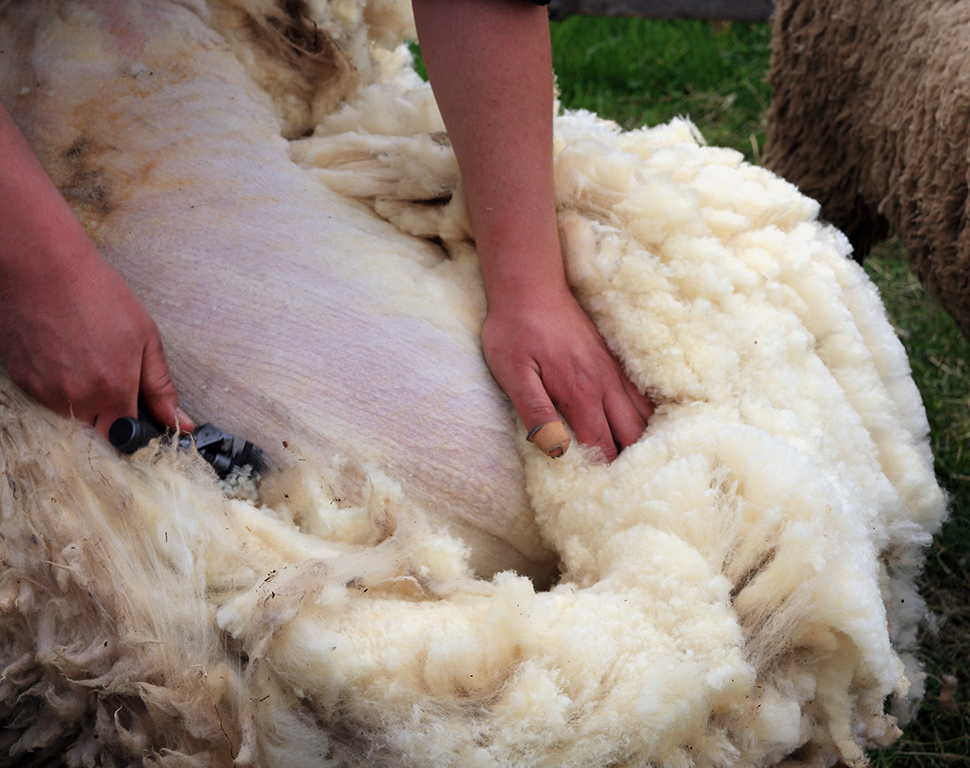Imagine having to wear a heavy coat in the heat of summer. I’m talking about wool in August. You’d be sweltering!
Now imagine for a moment that you’re a sheep. Your coat—which you cannot remove—grows continuously throughout the year.
Think how miserable that would be.
To ensure sheep live comfortably and to maintain their health, their coats must be sheared, or shaved off, regularly. This is because their ability to naturally shed has been largely bred out of most sheep.
Why Sheep Need Shearing
When a domesticated sheep’s coat becomes overly thick, the animal faces a number of life-threatening challenges.
Unshorn sheep cannot regulate their temperature as easily. Sheep, like people, can overheat. In the summer months, they can even die if not shorn. In addition, lice, mites, maggots, ticks, and other parasites can wreak havoc on an otherwise healthy sheep’s skin. A thickened wool coat means injuries, infestations, and sores may go unseen and untreated.
Thick coats are also more likely to matt or tangle. This can constrict blood flow to their limbs, causing painful sores, and preventing the sheep from moving properly.
Sheep that are not sheared are also more prone to being overweight, camouflaged in their heavy coat. If shearing is neglected, sheep can become so heavy with wool that they have trouble walking or running. Their ability to graze becomes compromised, and they can’t keep up with the flock for protection, or run from predators. Overgrown coats can develop into “wool blindness,” a condition that impairs the sheep’s sight.
There’s even a threat to ewes: wool overgrowth on a mother sheep can make it hard for her lambs to nurse.
Enter the sheep shearer.
The Symbiotic Relationship Between Sheep and People

The main reason to shear sheep is to make them comfortable and preserve their health throughout changing seasons. For more than 10,000 years, sheep have relied on humans to keep their coats trimmed.
A trained shearer uses either a manual or electric tool that safely removes the sheep’s wool coat. The actual process is not painful—it’s just like shaving for us or pet grooming. It is a humane practice recommended by large animal veterinarians.
Shearing is usually done in the spring, prior to lambing season. Professional sheep shearers are incredibly swift, often able to shear a single sheep in a minute or less! Where electricity is not available, sheep are still blade-sheared.
Another reason sheep are shorn is so their wool can be sold and spun into yarn. Wool is a time-tested fiber prized in cold-weather clothing. Wool has been—and continues to be—a historically important fiber. It is natural, renewable, and compostable.
Sheep grazing has many environmentally valuable advantages: strengthening soil health, mitigating climate change, and reducing fire danger by clearing dry vegetation that could become wildfire tinder.
Even farmers and ranchers who raise sheep exclusively for milk or cheese still shear their animals to keep them healthy. Sheep must be sheared at least once a year; some breeds grow wool faster and need to be sheared more often.
Frequent shearing yields cleaner, fresher, more desirable wool.
Happy Sheep, Happy Sleep

Humans have used wool insulation to create comfortable, healthy, and warm bedding for thousands of years. Modern studies support this ancient wisdom, verifying that wool helps us sleep longer and deeper. Wool regulates our temperature, is water-repellant, flame-resistant, soft, resilient, and non-allergenic.
We use the highest quality, sustainably sourced wool from New Zealand to make our EcoSleep mattresses. New Zealand sheep are renowned for having the whitest, strongest, and cleanest wool thanks to a combination of climate, care, and expert farming practices.
These fortunate sheep roam freely across some of the country’s most remote farms. Our Kiwi farmer-partners promote healthy, humane ecosystems for their herd. They follow the internationally recognized “five freedoms” for animal welfare.
Sheep are gently shorn and the wool is uniquely processed for added resilience and loft. Joma® Wool meets extremely strict limits for hundreds of harmful substances. Our wool is free from APEO, NPEO, pesticides, carcinogenic colorants, and heavy metals. It is OEKO-TEX® Standard 100 certified, a globally standardized, independent mark of quality for textile products. Specialized wool fiber from these sheep is superior.
When both sheep and the environment are well-cared for, we can rest easy.

